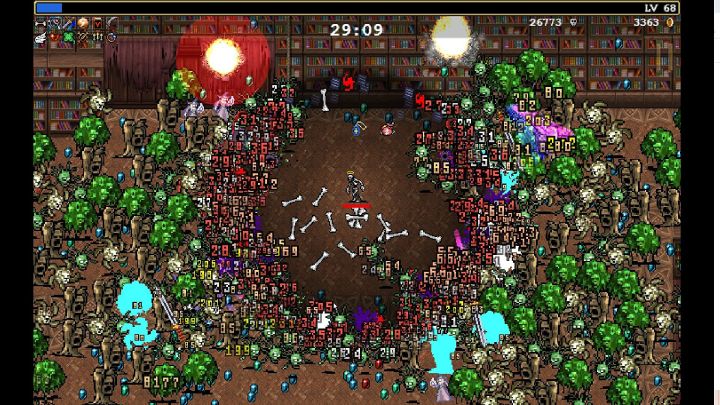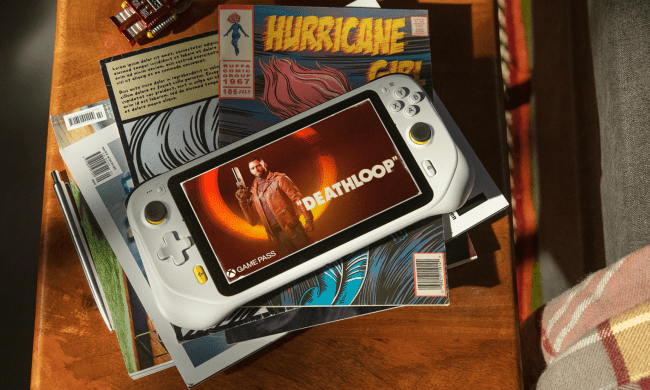Due to the nature of my job, my gaming habits are a little unusual. I tend to chew through long games in short bursts for review purposes and spend the time in-between sampling as many smaller titles as I can. I’m the kind of person who wants to see everything gaming has to offer, and I strive to get my hands on an array of unique experiences. It’s rare that I come back to a game once I’ve put it down. Practically speaking, it just doesn’t fit my lifestyle.
Yet that was challenged this year by a little $5 video game: Vampire Survivors. I initially dove into it in February as I tinkered around with my Steam Deck, and I figured those few hours I spent with it were where I’d stop. As the year progressed and I found myself catching up on my backlog, though, I suddenly found myself gravitating back to the mini-action game. Sometimes it was just checking in for an hour every month, but by December, it was the only game I really wanted to boot up.
Vampire Survivors is the rare game that’s fundamentally challenged how I think about how I play. It’s small enough to fit into those short moments of silence, but filled with so much content that I don’t feel like I’m ever scraping the bottom. At times, it’s thrilling in a way that few games can truly match. It’s by no means my favorite video game of 2022, but in some ways, it might be the closest thing this year has to a perfect one.
All I need
Vampire Survivors is at once the most visually chaotic and easy-to-play game of the year. The goal is simply to survive an ongoing wave of monsters for 30 minutes. The main character automatically attacks in idle game fashion, with players only guiding them around an endless map with a joystick. Instead of intense combos, the action is more focused on smart decision-making. Every time the character levels up by collecting experience points, players choose a new ability or upgrade. What starts with a tiny character shooting some magic beams every few seconds builds to a crescendo in the last minutes of a run as players can obliterate hundreds of swarming enemies in an instant.

It’s the kind of perfect storm I never realized I wanted from a video game until now. I’ve always enjoyed the catharsis of games like Hyrule Warriors: Age of Calamity, which make me feel like an all-powerful god capable of slashing down an entire army. The downside of games like that, though, is that they’re often physically demanding. They require constant button presses at a lightning-fast pace. By simplifying the control scheme, Vampire Survivors transformed something that’s usually a high-octane experience and made it a zen one.
That design philosophy made it something that slotted into my downtime more naturally than comparatively complex games that required my full attention. It was perfect for a 30-minute commute, that awkward hour where I was winding down before bed, or the last 45 minutes of an airplane ride where I was anxious to land. Vampire Survivors’ ultimate power is that it’s a time machine, eating away those empty moments with something immensely fun.
What hooked me more than anything isn’t so much the game as its content rollout. When I began playing in February, it was still in early access. There were a few levels and a handful of characters — enough to keep me occupied, but not so much that I was obsessing over it. Rather than delivering everything upfront, developer Poncle took a more steady approach with frequent, smaller updates. That’s even continued after its official 1.0 launch, expanding its life span even further.

Every time I logged in, there was always something new to try out. I could tackle a new stage I’d never seen or unlock a character that entirely changed my playstyle. While much bigger games like God of War Ragnarok feel entirely static when I return to them, Vampire Survivors has a kind of rolling momentum that most games dream of. That’s no doubt thanks to its smaller scale, which allows Poncle to consistently weave in meaningful updates that don’t require a major overhaul.
There’s an old meme in gaming that goes: “I want shorter games with worse graphics made by people who are paid more to work less and I’m not kidding.” Vampire Survivors is a shining example of why that line is more than a joke. Though it may be positioned as a micro-game with modest graphics, even this year’s grandest titles struggled to match the endless fun of Vampire Survivors. I’d take one game like this over most AAA games I play in a given year.
Vampire Survivors is available on PC, iOS, Android, and Xbox via Game Pass.




